#übermensch
Text
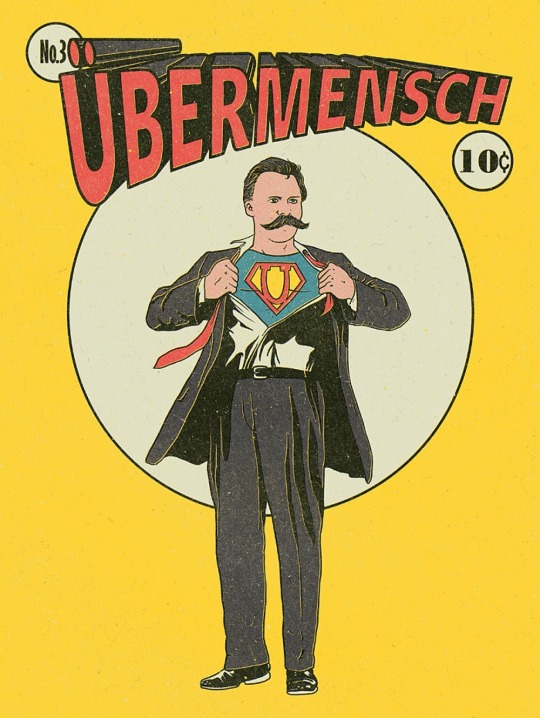
Friedrich Nietzsche, Übermensch
20 notes
·
View notes
Text
Meat is meat: THE MAD BUTCHER (Guido Zurli,1971)
Some months ago, I reviewed a film called Auntie Lee’s Meat Pies, in which I asked readers “What’s in your pie?” This film, The Mad Butcher (Lo strangolatore di Vienna), asks a far more profound question: “What’s in your sausage?” In each case, a better pronoun might have been “who”.
Guido Zurli was an Italian director but this film was made in English, set in Vienna and starred the wonderful,…
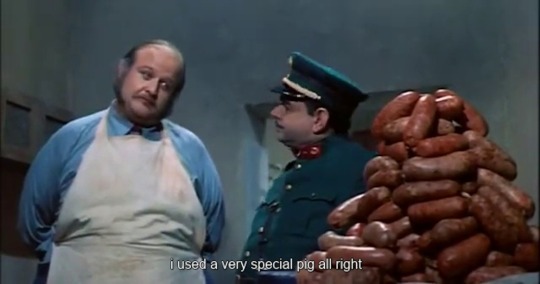
View On WordPress
#Übermensch#black comedy#cannibalism#Guido Zurli#H.G. Wells#Hannibal#human flesh#innocent cannibalism#Jack the Ripper#Lo strangolatore di Vienna#meat#meat is meat#Sweeney Todd#The Mad Butcher#Victor Buono#Vienna
3 notes
·
View notes
Quote
When the highest and strongest drives break out passionately and impel the individual far above and beyond the average and low level of the herd's conscience, the feeling of commonality in the community is destroyed; its belief in itself, its spine, as it were, breaks: as a result people brand these very drives and slander them most of all. The high independent spirituality, the will to stand alone, even powerful reasoning, are experienced as a danger. Everything which lifts the individual up over the herd and creates fear of one's neighbour from now on is called evil. The proper, modest, conforming faith in equality, the happy medium in desires take on the names of morality and honour.
Friedrich Nietzsche, Beyond Good and Evil, Aphorism 201
#nietzsche#friedrich nietzsche#beyond good and evil#q#moral philosophy#morals#will to power#übermensch
67 notes
·
View notes
Text
“ È una specie di pigrizia di mente quella per cui noi vogliamo spiegarci la storia mediante le opere di alcuni uomini: quand'anche furono grandissimi non poterono esser tali che per contingenze particolari, e perché interpretarono bisogni collettivi o sentimenti in formazione.
L'eroe silenzioso, come dice Carlyle, l'eroe che vive di se stesso e dalla sua anima ricava tutto, non è mai esistito né esisterà mai. Ma l'ammetterlo dà a noi una debolezza: poiché ci fa rassegnare a una specie di fatalismo buddista. Tante volte noi diciamo in un momento difficile: manca l'uomo. E attendiamo l'uomo provvidenziale. Anche adesso, nelle difficoltà dell'Italia presente, che sono prova del suo sviluppo, anche adesso noi ci domandiamo se tutto non finirebbe se avessimo un uomo. E bene: l'uomo è in noi stessi: è in ognuno di noi, e quando vorremo trovarlo noi lo ritroveremo.
Se non esistono uomini che vivano fuori e sopra il loro tempo — è noto che colui il quale ha trovato l'espressione di superuomo, Federico Nietzsche, ha finito, povero über mensch, in un manicomio — vi sono però uomini i quali riescono a compiere opere straordinarie e a fare ciò che la folla non riesce né meno a concepire.
In questo senso vi sono gli eroi. Quando un paese è soggetto a dominazione e la folla si rassegna, vi è un uomo che si ribella solo o con pochi; se egli non ha quasi speranza di vincere, se egli fa ciò che la moltitudine crede folle, egli è veramente un eroe. E allora o che il suo sangue sia lievito di rivolgimenti futuri, o ch'egli stesso vinca, nell'un caso e nell'altro è sempre un eroe. Ma l'eroe in questo senso non è che la espressione di un male: cioè della bassezza collettiva. I popoli che hanno nella civiltà moderna maggior numero di eroi, sono quelli che hanno una più grande depressione. “
---------
Brano tratto dal saggio breve Eroi (1898) raccolto in:
Francesco Saverio Nitti, Eroi e briganti, Edizioni Osanna (collana Biblioteca Federiciana n° 3), Venosa (PZ), 1987¹; pp. 13-14.
#leggere#letture#eroismo#citazioni#saggio storico#Storia#filosofia della Storia#saggistica#fatalismo#civismo#politica#Francesco Saverio Nitti#politici italiani#Lucania#Übermensch#uomo della provvidenza#civiltà#società umane#superuomo#Friedrich Nietzsche#Thomas Carlyle#superomismo#coraggio#questione meridionale#liberazione#Italia meridionale#libertà#Mezzogiorno d'Italia#meridionalismo#Basilicata
10 notes
·
View notes
Link
#friedrich nietzsche#friedrich wilhelm nietzsche#eternal return#perspectivism#nihilism#übermensch#philosophy of science#untimely meditations#eternal recurrence#nietzsche#inna besedina
5 notes
·
View notes
Text
youtube
#nietzsche#friedrich nietzsche#nietzschequotes#voluntad de poder#Übermensch#Dios ha muerto#Nihilismo#Youtube
0 notes
Text
"Exploring the Philosophical Depths: Friedrich Nietzsche's 'Beyond Good and Evil'"

Friedrich Nietzsche's "Beyond Good and Evil" is a philosophical tour de force that challenges conventional morality and calls into question the very foundations of Western thought. Published in 1886, this seminal work presents a radical critique of traditional ethics, religion, and metaphysics, advocating for a reevaluation of values based on individual will and self-overcoming.
At its core, "Beyond Good and Evil" is a relentless interrogation of morality and its origins. Nietzsche famously declares that "God is dead," signaling the collapse of traditional religious beliefs and the need for a new ethical framework rooted in human experience and perspective. Throughout the text, he dismantles the dichotomy between good and evil, arguing that moral judgments are subjective and contingent upon individual interpretation.
Nietzsche's prose is both incisive and provocative, filled with aphoristic insights and paradoxical statements that challenge readers to think deeply about the nature of existence. He explores a wide range of topics, from the nature of truth and knowledge to the psychology of power and domination. Through his critique of traditional values, Nietzsche seeks to liberate individuals from the constraints of herd mentality and encourage them to embrace their own unique potential.
Central to Nietzsche's philosophy is the concept of the "will to power," which he defines as the driving force behind all human behavior. He argues that individuals must strive to overcome societal norms and constraints in order to achieve self-realization and become what he calls "übermensch" or "overman." This idea of transcending conventional morality and embracing one's own instincts and desires is central to Nietzsche's vision of a liberated and creative humanity.
Throughout "Beyond Good and Evil," Nietzsche challenges readers to confront uncomfortable truths about human nature and the nature of reality itself. He exposes the hypocrisy of moral absolutism and calls for a more nuanced understanding of ethics based on individual autonomy and self-expression. While his ideas may be controversial and unsettling, they have profoundly influenced modern philosophy and continue to provoke debate and discussion to this day.
In conclusion, "Beyond Good and Evil" stands as a testament to Nietzsche's intellectual daring and visionary insight. With its bold critique of traditional morality and its call for a new era of individualism and self-assertion, the book remains a powerful and relevant work that challenges readers to question their most deeply held beliefs and assumptions about the world.
Friedrich Nietzsche's "Beyond Good and Evil" is available in Amazon in paperback 12.99$ and hardcover 19.99$ editions.
Number of pages: 227
Language: English
Rating: 10/10
Link of the book!
Review By: King's Cat
#Friedrich Nietzsche#Beyond Good and Evil#Philosophy#Morality#Ethics#Will to power#God is dead#Übermensch#Individualism#Nihilism#Truth#Knowledge#Existentialism#Perspectivism#Critique#Self-overcoming#Human nature#Psychology#Herd mentality#Transcendence#Freedom#Autonomy#Subjectivity#Objectivity#Criticism#Truth-seeking#Cultural critique#Value systems#Interpretation#Contradiction
0 notes
Text
"Exploring the Philosophical Depths: Friedrich Nietzsche's 'Beyond Good and Evil'"
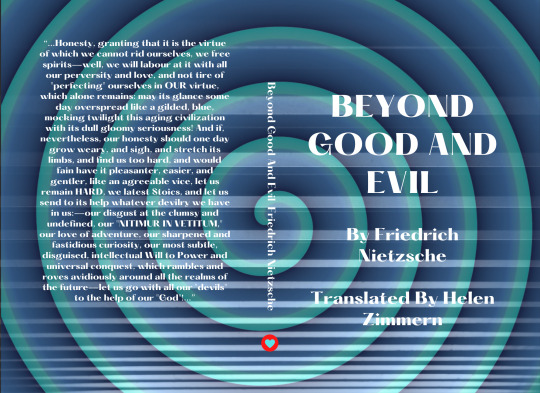
Friedrich Nietzsche's "Beyond Good and Evil" is a philosophical tour de force that challenges conventional morality and calls into question the very foundations of Western thought. Published in 1886, this seminal work presents a radical critique of traditional ethics, religion, and metaphysics, advocating for a reevaluation of values based on individual will and self-overcoming.
At its core, "Beyond Good and Evil" is a relentless interrogation of morality and its origins. Nietzsche famously declares that "God is dead," signaling the collapse of traditional religious beliefs and the need for a new ethical framework rooted in human experience and perspective. Throughout the text, he dismantles the dichotomy between good and evil, arguing that moral judgments are subjective and contingent upon individual interpretation.
Nietzsche's prose is both incisive and provocative, filled with aphoristic insights and paradoxical statements that challenge readers to think deeply about the nature of existence. He explores a wide range of topics, from the nature of truth and knowledge to the psychology of power and domination. Through his critique of traditional values, Nietzsche seeks to liberate individuals from the constraints of herd mentality and encourage them to embrace their own unique potential.
Central to Nietzsche's philosophy is the concept of the "will to power," which he defines as the driving force behind all human behavior. He argues that individuals must strive to overcome societal norms and constraints in order to achieve self-realization and become what he calls "übermensch" or "overman." This idea of transcending conventional morality and embracing one's own instincts and desires is central to Nietzsche's vision of a liberated and creative humanity.
Throughout "Beyond Good and Evil," Nietzsche challenges readers to confront uncomfortable truths about human nature and the nature of reality itself. He exposes the hypocrisy of moral absolutism and calls for a more nuanced understanding of ethics based on individual autonomy and self-expression. While his ideas may be controversial and unsettling, they have profoundly influenced modern philosophy and continue to provoke debate and discussion to this day.
In conclusion, "Beyond Good and Evil" stands as a testament to Nietzsche's intellectual daring and visionary insight. With its bold critique of traditional morality and its call for a new era of individualism and self-assertion, the book remains a powerful and relevant work that challenges readers to question their most deeply held beliefs and assumptions about the world.
Friedrich Nietzsche's "Beyond Good and Evil" is available in Amazon in paperback 12.99$ and hardcover 19.99$ editions.
Number of pages: 227
Language: English
Rating: 10/10
Link of the book!
Review By: King's Cat
#Friedrich Nietzsche#Beyond Good and Evil#Philosophy#Morality#Ethics#Will to power#God is dead#Übermensch#Individualism#Nihilism#Truth#Knowledge#Existentialism#Perspectivism#Critique#Self-overcoming#Human nature#Psychology#Herd mentality#Transcendence#Freedom#Autonomy#Subjectivity#Objectivity#Criticism#Truth-seeking#Cultural critique#Value systems#Interpretation#Contradiction
1 note
·
View note
Text
A Modest Proposal
American "Patriots" 1939.
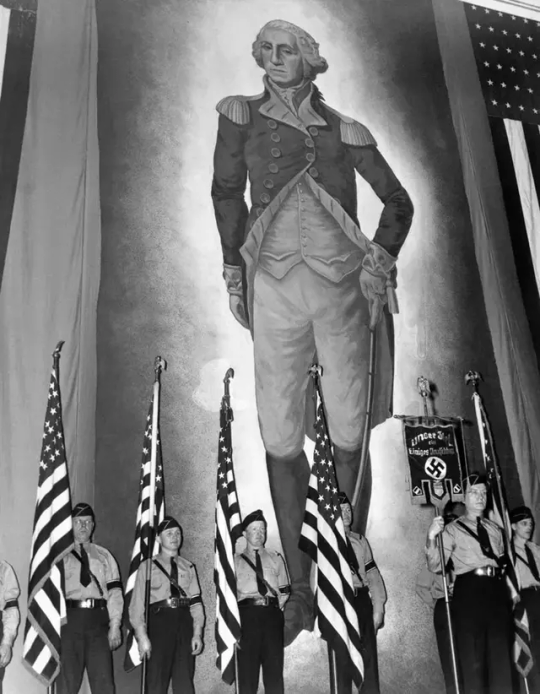
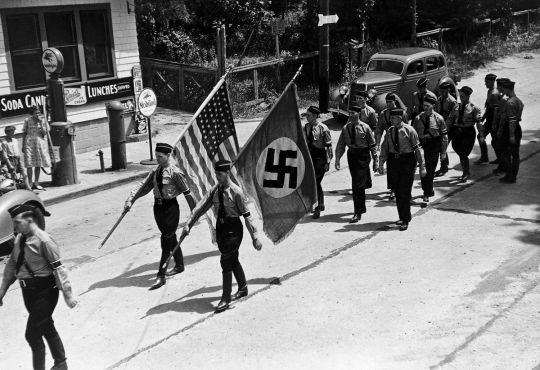

I propose a "New" flag for our new modern American "Patriots"...
Afterall, we don't want the brown people in the USA, and Russia doesn't want their criminals and other undesirables, and brown people polluting their space either. Send them to Ukraine so they can be ground up fighting the ungrateful and undesirable Slavs who refuse to "know their place".
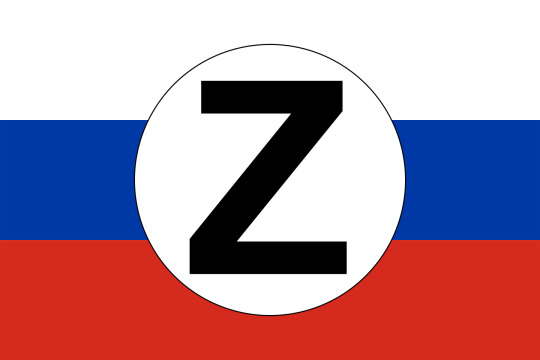
It seems apropos.
1 note
·
View note
Text



Warrior era. Übermensch arch.
0 notes
Photo

übermensch much?? and now just awaiting the suspenseful release of the FBI’s findings ⚛️ but until then… 🤞🤞 #unparalleleduniverse @soprissun #45 #fbiraid #übermensch #prometheus #maralago #hahahaha https://www.instagram.com/p/ChY0wfROZoB/?igshid=NGJjMDIxMWI=
0 notes
Text
So, apparently, there's this popular headcanon among bleach fans that says that Arrancar's Hollow hole somehow represents the way in which they died.
And —apparently—, in Harribel's particular case, some people have the idea that her Hollow hole being in her uterus means something like miscarriage or death during childbirth; and, consequently, her aspect of death (sacrifice) is often considered here as a sign of love.
But, knowing Kubo, I'm pretty sure it was a nod to something else:
There's a cannibalistic practice known as oophagy: It is when embryos feed on the eggs produced by the maternal ovary while still inside the mother's uterus. It seems to occur in all species of the order Lamniformes, which includes numerous species of sharks. It allows the surviving embryos to grow larger and begin to prepare for life as predators (although other records also point to genetic competition). Anyway, for the good of their species and themselves, sharks sacrifice their siblings by eating them to gain strength. Harribel's hollow hole is more like a reminder of how, in order to survive, nature forces us to make sacrifices, even if cruel.
There's nothing wrong with the childbirth headcanon, of course; but I do believe it is interesting how the fandom's interpretation is more oriented towards a more compassionate form of sacrifice, while Tite's intention was probably to show a crueler side to it— one that, unfortunately, is also meant to describe her relationship with Aizen, and how once he no longer thought she was useful, he simply tried to get rid of her. The Espada were just tools, always meant to be a sacrifice for something bigger in Aizen's plans.
#i'm just rambling#But I do think this is funny#and it also connects to Aizen being a representation of Nietzsche's Übermensch#but that's another topic#Bleach#bleach manga#tia harribel#tier harribel#aizen sousuke#arrancar#espada#tw: miscarriage
46 notes
·
View notes
Text
People in real life celeb tags posting their x reader creative writing like! Mon Dieu!! This is the confidence we all dream of one day embodying. To have the absolute lack of shame required to write and post actor of that guy from euphoria oral - nietzschean af transcendence . You just know theyre so grounded in their earthly delights. You know that God is so dead for them
3 notes
·
View notes
Text
“Sometimes people don't want to hear the truth because they don't want their illusions destroyed.”

Friedrich Nietzsche was a German philosopher, prose poet, and cultural critic.
Born: 15 October 1844, Röcken, Lützen, Germany
Died: 25 August 1900, Weimar, Germany
#Philosopher#Existentialism#Nihilism#Ethics#Will to power#Übermensch (Superman)#Eternal recurrence#Amor fati (Love of fate)#Genealogy of morals#Beyond good and evil#Dionysian/Apollonian#Critique of religion#Truth and knowledge#The death of God#Perspectivism#Master-slave morality#Art and aesthetics#Human nature#Individualism#Free will#today on tumblr#quoteoftheday
2 notes
·
View notes
